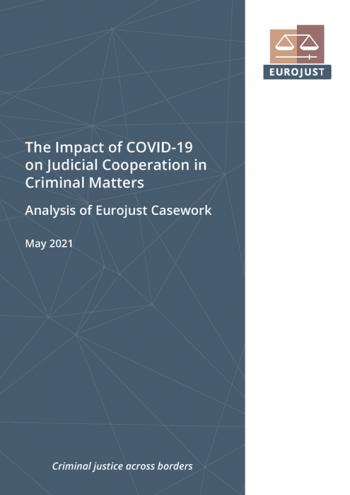Clarifying legal issues and helping with postponement procedures are just two ways Eurojust has assisted more than 100 judicial authorities who last year faced particular problems with the execution of European Arrest Warrants (EAWs) at the outbreak of the COVID-19 pandemic. Furthermore, the Agency has supported practitioners by providing information on travel restrictions and extending EAW deadlines, calling on a state of emergency when necessary.
These are some of the conclusions from the report The Impact of COVID-19 on Judicial Cooperation in Criminal Matters – Analysis of Eurojust’s Casework, which has been published today. The report provides practical guidance for judicial practitioners on matters such as European Investigation Orders (EIOs) and requests for mutual legal assistance (MLA).
The EAW mechanism continued to function during the lockdown period in many countries. Certain measures – such as the closure of borders, compulsory quarantine and shortages of police staff – nevertheless had effects on the physical surrender of the persons sought to other Member States. In many cases, practitioners contacted Eurojust for guidance and assistance.
The report analyses all 128 concrete requests sent to the Agency between April and June of last year, when lockdowns in many countries created sudden and unexpected practical problems. In view of Article 23 of the EAW Framework Decision, in principle, every surrender needs to take place within ten days. This proved to be practically difficult and Eurojust could assist in most case with arranging the right postponement procedures, enabling information exchange and providing advice on which rules to apply and how to ensure their right application.
The experience built up during this period can now serve as practical guidance for judges and prosecutors who deal with EAWs and extradition procedures, for which the report is a good reference. Furthermore, the report gives concrete information on how to deal with potential issues regarding the execution of EIOs and MLA requests, as well as many other practical COVID-19-related issues for practitioners.
At the start of the pandemic, the Agency rapidly changed to a fully digitalised working environment and provided practitioners advice on how to enable this. The overarching conclusion is that the pandemic has emphasised the clear need among practitioners in all Member States for a rapid and complete digitalisation of justice across the European Union. Eurojust has already been tasked by the European Commission to roll out a programme for Digital Justice and will play a central role in its implementation.

